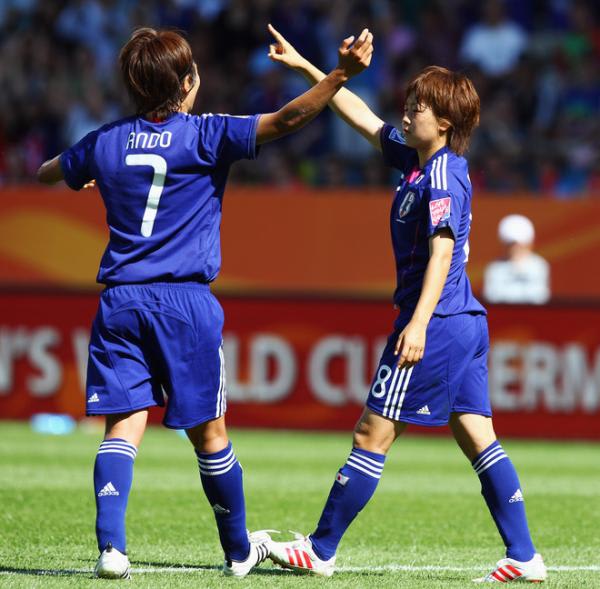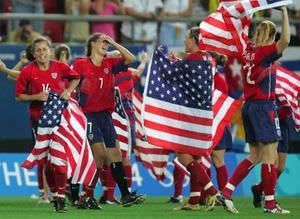
引き続き、2011年ワールドカップ・ドイツ大会での<なでしこジャパン>の活躍に触れた英文テクストを題材に選びました。いずれも決勝での日米決戦に瞠目している旨を吐露したもの。サッカー通の一方の総本山、FIFAの公式サイトの記事と、他方、New York Times に掲載された、The Times の senior editor、Lawrie Mifflin氏のコラムです。
もちろん、皆さんはその結果をご存知のはず。そう、「2011年3月11日午後2時46分」から129日後、3087時間38分後の日本時間2011年7月18日午前6時24分、PK戦の末にアメリカを「3-1」で降して<なでしこ>が初めて世界一の座に輝きました。
そして、この優勝は必ずしも運によるものだけではない。と、私はそう考えています。実際、実は、決勝で戦ったそのアメリカの代表監督、スウェーデン国籍のPia Sundhage女史は、忘れもしない2008年8月18日、北京オリンピックの女子サッカー準決勝、その試合で日本を「4-2」で降した直後、FIFA Com.にこんなコメントを寄せているのですから。

・USA-Japan: Quotes-Pia Sundhage, USA coach
I don't think the win was comfortable. Japan played well, if you see how they kept possession of the ball, that could be a role model for women's football in the future. ・・・
・日米戦:コメント録-Pia Sundhage米国代表監督
この勝利はけして楽なものではありませんでした。日本は見事に戦った。この試合を通して、日本がボールの支配権をいかにして保持したかを目にした方は、それが将来の女子サッカーが到達すべきあり方について一つのモデルを提示したものと感じたのではないでしょうか。(後略)

と、閑話休題。
今回の英文テクストもTOEICパート7の後半問題に見たてて、ご自分がTOEICの出題者ならこの2パッセージからどんな設問を作るか。そう考えながら読んでいただければTOEIC対策の効果も一入、鴨です。そして、もう一つ言えば、ある英文テクストを読んだり聞いたりするときに、そのテクストの背景となる知識があるのとないのとでは、テクスト理解の精度もテクストの理解に要する時間も全然異なってくるということ。このことを体感していただきたいのです。
・出題者になったつもりで設問と選択肢を考えながら読む
・テクストの背景的な知識の重要性を<痛感>しながら読む
英文理解における背景的知識の重要性。これは TOEIC や TOEFL の対策についても言えること。ですから、ある賢い(?)受験者の中には、TOEIC対策として、オフィシャルガイドと市販のTOEIC問題集でパート7やパート4のパッセージの和訳だけを何度も読んだという方もおられる。そして、笑い話ではなく、「結構効果があった」とか。本当にそうなんだろうなと私も思います。どんなビジネスの場面や生活の場面を舞台にした英文が出題されるか。そのことをあらかじめ知っているのと知らないとでは英文理解のパフォーマンスも格段に違ってくるということ。逆に言えば、だからこそ、間違いなく、言語はイデオロギーの束であり、外国語教育はイデオロギー教育であり、外国語学習は異文化理解の営みでもあるのでしょうから。
そして、どんなエリアのどんな知識が足りないのか、「テクストの背景的な知識の重要性を痛感」できたら、そう、それも計画を立てるなりして貪欲に(TOEIC対策ならTOEICのために絞り込んで、つまり、必要な知識のエリアと範囲・深度を限定して、)そのような知識を吸収すればよい。その際、重要なことは、「テクストの背景的な知識」の調達には、必ずしも英語で読み聞きする必要はなく、日本語を通してそれができるならそれも結構ということです。上で俎上に載せた「TOEIC問題集でパート7やパート4のパッセージの和訳だけを何度も読んだという方」は、正に、そのような方法を実践されたということでしょう。

Japan and USA set up intriguing final
On an absorbing and incident-packed semi-final day at the FIFA Women's World Cup Germany 2011™, Japan and USA saw off strong challenges from Sweden and France respectively to set up a mouth-watering final on Sunday. On the tenth FIFA Anti-Discrimination Day, the Nadeshiko made it through to the decider for the very first time, while the Stars and Stripes booked a third appearance in the fixture.
The current Olympic champions and leaders of the FIFA/Coca-Cola Women's World Ranking overcame Bruno Biri's charges 3–1 in Monchengladbach, thanks to a typically determined and ruthless display against opponents who again won plaudits for their slick passing interchanges. ・・・
Later in the evening, Japan's tactical discipline and sublime skills proved just too much for Sweden, who opened at a cracking pace but faded towards the end. Homare Sawa’s badly mis-placed pass let in the Europeans to open the scoring in Frankfurt, but the star midfielder later put her side 2–1 in front, turning the game on its head. The Japanese eventually ran out 3–1 winners, in a match in which Thomas Dennerby's team ended up ruing Caroline Seger’s late withdrawal due to a calf injury.
The final now promises an enthralling, top-quality clash of styles, as American power goes up against the slick passing and skill of the Japanese.
(254 words)
【出典:FIFA.com, 13 July 2011】

Women’s World Cup: This Time, a Show Worth Watching
When the Women’s World Cup was played the United States in 1999, I went to the opening game at Giants Stadium, eager to be supportive. The atmosphere was great, the soccer dreadful. So slow, so clumsy — the women looked as if they were trying to play soccer under water. In 2003, and in 2007, I had trouble making myself watch on television.
Let me be politically correct about it, though. I did feel ashamed. As a woman, a sports fan, a former athlete, even as a mother who once coached youth soccer, I knew I should have been boosting the Women’s World Cup. I should have been talking it up; I should have been sassing my soccer friends who pooh-poohed and said it wasn’t worth watching. But, with regret, I agreed with them.
Now it’s back. In cities across Germany, 16 teams have been competing for the sixth World Cup title (men have had 19) and — thanks to a buzzer-beater against Brazil and some true grit against France — the Americans meet Japan in Sunday’s final in Frankfurt.
Am I watching this time? Indeed I am. And I’m trying to figure out why.
The quality of play is better, but it’s still not the caliber of top-flight men’s soccer. Nations other than the United States have improved (shades of Dream Teams being overtaken in Olympic basketball), but there’s still a wide gap between the handful at the top and the rest. Women’s pro leagues exist, but honestly, they haven’t generated much interest.
So what is it?
I’m struck by how rapidly the women have improved, even since 2007 — and by a weird sensation of watching history in motion.

Think about tennis. When Billie Jean King first lobbied for prize money comparable to the men’s, people scoffed that the women’s game was an inferior product. And perhaps it was — for a while. Women’s tennis grew, all over the world, because King and pioneers like her ignored the critics and played their hearts out, getting better all the time.
In the Olympics, women were not allowed to run any distance longer than 1,500 meters until 1984. That year, Joan Benoit won the first women’s marathon in a time of 2 hours 24 minutes 52 seconds. Less than 20 years later, Paula Radcliffe set the world record at 2:15:25. That’s clearly a case of getting better, fast.
And I can see this pattern elsewhere. In the 1970s, girls agitated to play Little League baseball and were told they were too fragile. Now Little League is coed. When I went to college, at a university new to having women as undergraduates, some of us started a field hockey team. Now, when I go back and see players with 10 times our skill, 10 times our fitness, marauding downfield in their own hockey stadium, I’m amazed at how far they have come.
Mia Hamm, Michelle Akers, Kristine Lilly — they were pioneers in 1999, winning the Cup on American soil, captivating millions of girls and surely motivating many to commit themselves to competitive sports. For this, I applauded them. But watch them? Only on charitable terms, the way you would buy a candy bar to support your local school team.
Today, it’s so different. The skillful passing of the French team; the “wow” quotient of Brazil’s Marta; the slick ball control and darting movement off the ball of Japan’s Aya Miyama; Hope Solo’s defiant goalkeeping, and the leaping power of Abby Wambach heading into the net — these are just a few highlights of a very impressive tournament.
As good as the best men’s teams? No. Worth watching? Absolutely.
(601 words)
【出典:New York Times, July 16, 2011】

【語彙1】
set up:~の準備を整える, intriguing:興味をそそる/魅力的な, absorbing:興味の尽きない/見るものを夢中にさせる, incident-packed:話題がてんこ盛りの, see off:強敵の襲撃を切り抜けて追い払う/ゲームに勝つ, respectively:各々, mouth-watering:よだれの出そうなくらい美味しそうな, FIFA Anti-Discrimination Day:FIFA差別反対宣言の日, make it through to:~までなんとか苦労しながら辿りつく, decider:決勝戦, book:予約する, fixture:(実施の日程の決まっている)試合,
current:現在の, leader(s) of a ranking:ランキング1位の人(チーム), overcame:打ち負かす/克服する, thanks to:~のお蔭で/~を原因として(cf. due to), typically:典型的な/例によって, determined and ruthless:毅然として無慈悲な, display:感情や意志の表出行為, plaudit:称賛, slick:巧みな,
tactical:戦略にたけた, discipline:凛然とした, sublime:秀麗な, too much for:~の手に負えない, at a cracking pace:速い速度で, let in A to-V:Aが~することを許す, in front:先頭に/前に/先に, turn A on its head:逆転する/逆さまにする,
eventually:途中のプロセスではいろいろあったが結局は, run out:~をやり遂げる, winner(s):勝者/勝利, end up:~でもって終える, withdrawal:出場取り止め, due to:~のお蔭で/~を原因として(cf. thanks to), calf:ふくらはぎ, enthralling:魅力的な, go up against:~に立ち向かう/~と戦う

【語彙2】
eager to-V:~することを切望する, dreadful:凄まじく酷い, clumsy:不器用な, politically correct:建て前から言えば, though;(文末に置いて)けれども, boost:応援する/力になってあげる, talk up:褒める/推奨する, sass:口答えする/意見する/物申す, pooh-pooh:軽くあしらう/馬鹿にする, with regret:残念なことに, compete for:~を手に入れるべく競争する, buzzer-beater:試合終了直前に得点を入れること, grit:根性/気骨,
figure out:理解する/問題を解決する, caliber:度量/力量, top-flight:一流の, handful:一握りの少数のものごと, generat:生産する/生み出す, weird:奇妙な, sensation:感覚,
lobby for:~を実現するべく働きかける(cf. lobby against「反対すべく働きかける」), comparab:類似の/同格の, scoff:嘲笑う, for a while:しばらくの間は, ignore:無視する/歯牙にもかけない, all the time:その間ずうっと, set a record:記録を作る/記録を更新する, elsewhere:他の所でも, agitate:声高に論じる, fragile:虚弱な, field hockey team:ホッケー, maraud downfield:守備陣地を相手のボールを狙って走り回る,
captivate:魅了する, commit oneself to-V:自分自身を~することに熱中させる, competitive:競争的な, applaud:拍手喝采する, charitable terms:慈善的な気持ちの言葉遣い, wow quotient:素晴らしい比率の実績, dart:矢のような動き, defiant:喧嘩腰の, leaping power:跳躍力

<続く>



















